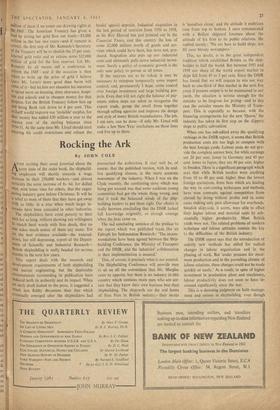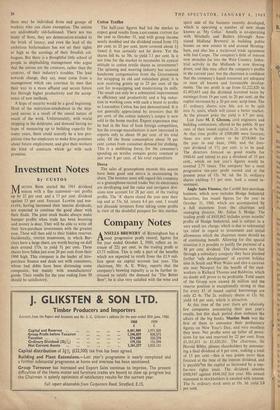Rocking the Ark
By JOHN COLE A.I lER reciting their usual jeremiad about the . sorry state of the order book, the shipbuild- !og employers will shortly concede a wage Increase to their 250,000 workers—and almost certainly the same increase of 8s. 6d. for skilled men, with lesser rises for others, that the engin- eering industry gave before Christmas. It will be a relief to most of them that they have got away with so little, in a year when much larger in- creases have been conceded in other industries.
The shipbuilders have cried poverty to their Illen for so long, without showing any willingness to match hard words with firm deeds, that no One takes much notice of them any more. Yet O n the best evidence available—the watered- down, but still depressing, report of the Depart- fluent of Scientific and Industrial Research_ tritish shipbuilding is really headed for serious trouble in the next few years.
This report deals with the research and development requirements of both shipbuilding and marine engineering, but the deplorable circumstances surrounding its publication have reduced both its authority and its impact. When an early draft leaked to the press, it suggested a Much less flabby document than that which eventually emerged after the shipbuilders had ---- pressurised the authorities. It may well be, of course, that the published version, with its end- less qualifying clauses, is the more accurate assessment of the industry. When I was on the Clyde recently, the comforting story which was being put around was that sonic cocksure young economists had got the whole thing wrong, and that it took the balanced minds of the ship- building leaders to put them right. Our choice is really between concluding that the DSIR lacked full knowledge originally, or enough courage when the heat came on.
The sad concluding sentence of the preface to the report which was published reads like an Epitaph for Independent Research: 'The recom- mendations have been agreed between the Ship- building Conference, the Ministry of Transport and the DSIR, and the industries' collaboration in their implementation is assured.'
This, of course, is precisely what is not assured. The Shipbuilding Conference will provide men to sit on all the committees that Mr. Marples cares to appoint, but there is no industry in this ccruntry which contains more men who are cer- tain that they know their own business best than shipbuilding. The shipyards arc the real home of Sinn Fein in British industry—their motto is 'ourselves alone,' and the attitude it enshrines runs from top to bottom. I once remonstrated with a Belfast shipyard foreman about the attitude of his firm to its public relations. He replied sternly: We are here to build ships, not fill your bloody newspapers.'
This, no doubt, is in the great independent tradition which established Britain as the ship- builder to half the world. But between 1951 and 1959 our share of the world export market in ships fell from 49 to 3 per cent. Since the DSIR has found that we will.require to win our way back to one-third of that market in the next five years if present output is to be maintained in our yards, the situation is serious enough for the outsider to be forgiven for prying—and in this case the outsider means the Ministry of Trans- port. This is especially so because, with the financing arrangements for the new 'Queen,' the industry has taken its first step on the slippery slope to public subvention.
When one has sub-edited away the qualifying verbiage in the DSIR report, it seems that British production costs are too high to compete with the best foreign yards. Labour costs do not pro- vide the complete answer here, for while earnings are 20 per cent. lower in Germany and 45 per cent. lower in Japan, they are 40 per cent. higher in Sweden. There is a significant paragraph which says that while British tenders were anything from 10 to 40 per cent. higher than the lowest foreign quotations, firms here which are leading the way in cost-cutting techniques and methods have won contracts against competition from abroad by doing without profits and in some cases making only part allowance for overheads. Swedish shipyards, it seems, were able to offset their higher labour and material costs by sub- stantially higher productivity. Most British yards were not. The related problems of modern technique and labour attitudes contain the key to the difficulties of the British industry.
The DSIR report says that the introduction of entirely new methods has called for radical changes in labour organisation and in the phasing of work. But 'under pressure for maxi- mum production and in the prevailing climate of labour relations, these changes could not be made quickly or easily.' As a result, in spite of higher investment in production plant and machinery, labour productivity does not seem to have in- creased significantly since the war.
This is a damning judgment on both manage- ment and unions in shipbuilding, even though there may be individual firms and groups of workers who can claim exemption. The unions are undoubtedly old-fashioned. There are too many of them, they are demarcation-minded to the brink of lunacy, and even the lead of the ambitious boilermakers has not set their sights as high as the earnings of their Swedish col- leagues. But there is a thoughtful little school of people in shipbuilding management who argue that the unions are the creatures, rather than the creators, of their industry's troubles. The lead towards change, they say, must come from a management which can convince its men that their way to a more affluent and secure future lies through higher productivity and the accep- tance of new methods.
A hope of security would be a good beginning. Most of the restriction-mindedness in the ship- yard unions is a result of the casual nature of much of the work. Unfortunately, with world shipping in the doldrums, and demand having no hope of measuring up to building capacity for many years, there could scarcely be a less pro- pitious time for employers to make firm promises about future employment, and give their workers the kind of contracts which go with such promises.











































 Previous page
Previous page